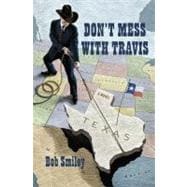
Note: Supplemental materials are not guaranteed with Rental or Used book purchases.
Purchase Benefits
What is included with this book?
BOB SMILEY began his writing career as a research assistant to the late, great William F. Buckley, Jr. In 2008, he wrote the sports memoir Follow the Roar, chronicling his journey around the globe as he followed Tiger Woods for every hole of an entire season. He continues to work in television and film, having written for network sitcoms as well as for Fox News Channel’s Half Hour News Hour. He recently wrote a Goonies-esque pilot for Disney XD and is developing a half-hour political comedy for AMC.
“Bob Smiley gives us two things we really need: 1) a funny book about politics and 2) a Texas governor we can all get behind. Ben Travis forever!" --Steve Hely, producer and writer for The Office and author of How I Became a Famous Novelist
"If there were a Nobel Prize for political wit, Bob Smiley’s novel Don’t Mess With Travis would win it in a landslide. Much needed in this angry political season!"-- Steve Forbes
“Some people might say that Don’t Mess with Travis is a mix of Carl Hiaasen and George Will. But it’s more than just a witty blend of larger-than-life characters and a prescient political narrative: It’s intelligent satire—true on both the human and policy dimensions—that would make a great movie. Bob Smiley is this generation’s Christopher Buckley.” --Ilya Shapiro, The Cato Institute
"A terrific read for the 2012 campaign season-- a political satire funny for folks on either side of the aisle." --Jeremy Blachman, author of Anonymous Lawyer
The New copy of this book will include any supplemental materials advertised. Please check the title of the book to determine if it should include any access cards, study guides, lab manuals, CDs, etc.
The Used, Rental and eBook copies of this book are not guaranteed to include any supplemental materials. Typically, only the book itself is included. This is true even if the title states it includes any access cards, study guides, lab manuals, CDs, etc.